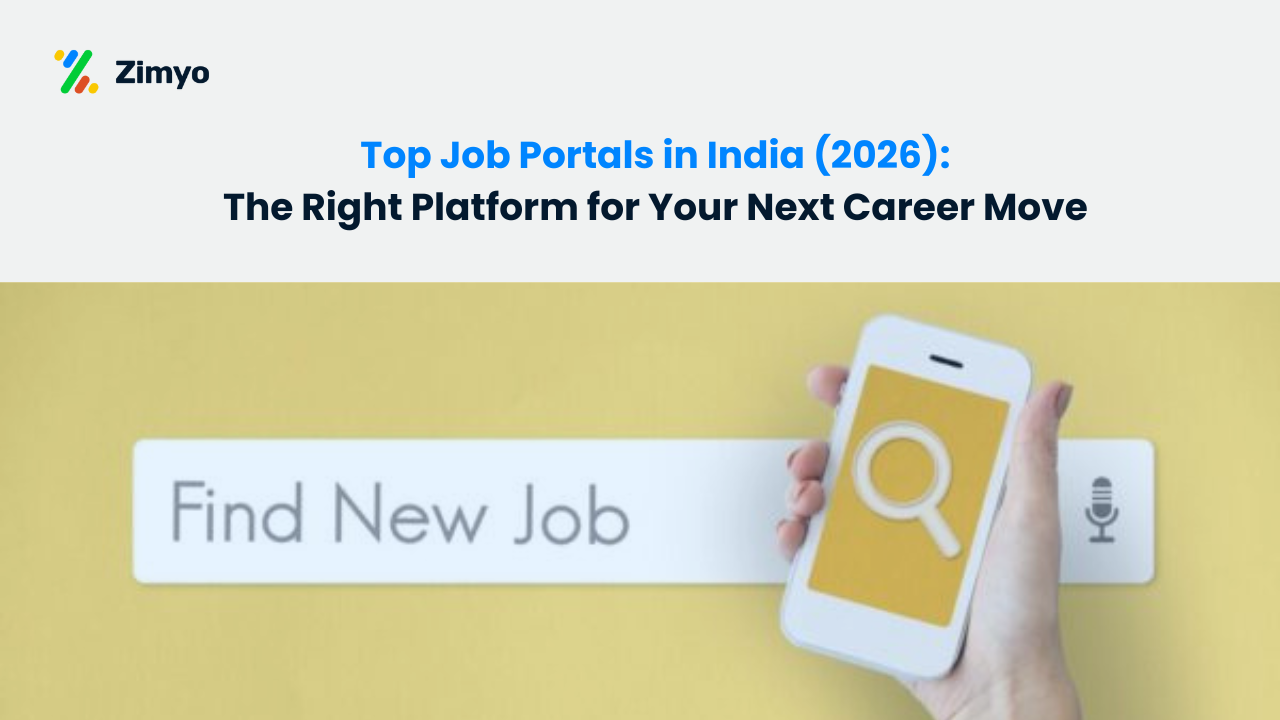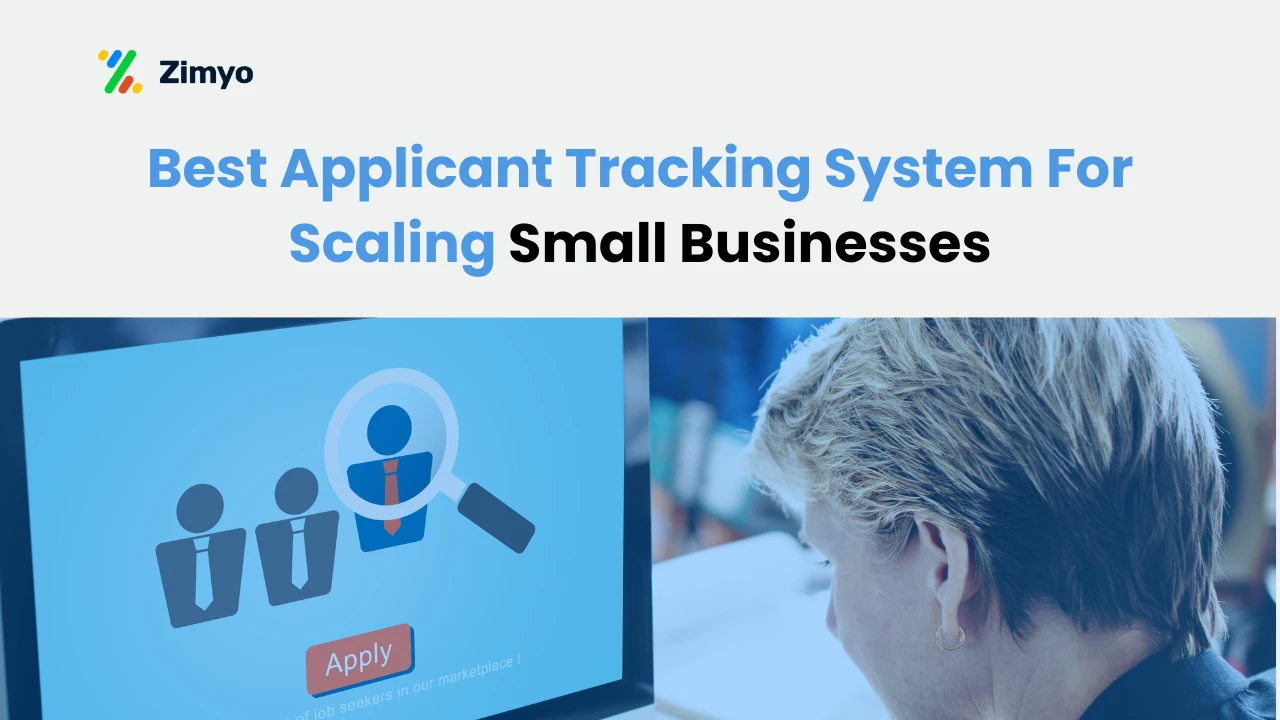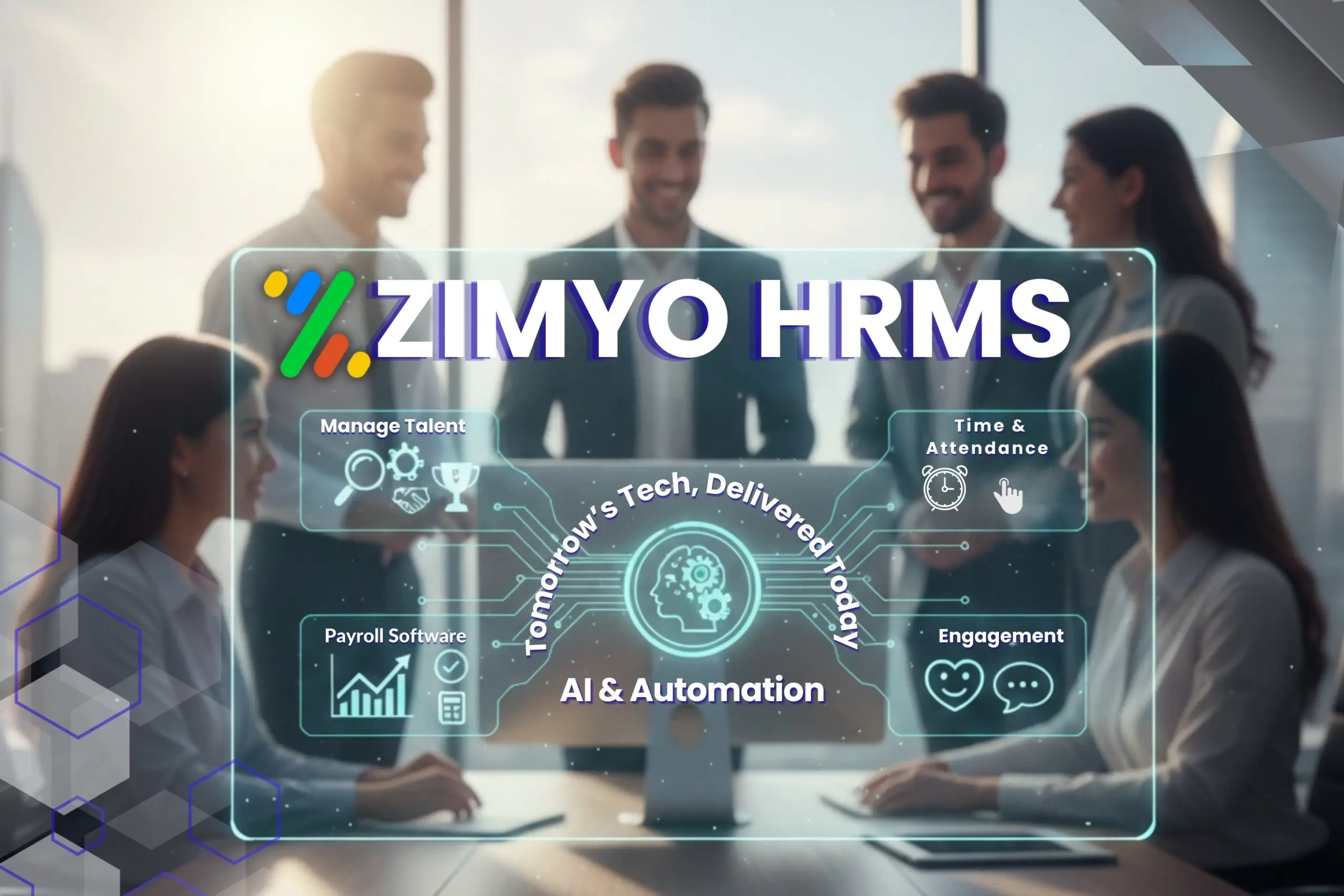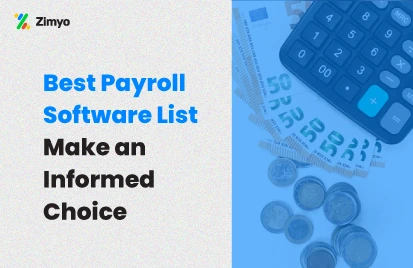Choosing the right cloud HR software can be confusing. With so many options available, two names often stand out: Zimyo and HROne. Each software is strong in different areas. If you’re looking for a detailed Zimyo vs HROne comparison, this blog explains their features, pricing, pros and cons, and helps you find which HR software suits your business best.
Brief Introduction to Zimyo
Zimyo is a modern HRMS (Human Resource Management System) that offers a complete “hire-to-retire” solution for businesses. It is widely used by small businesses, startups, and growing companies in the USA and other regions.
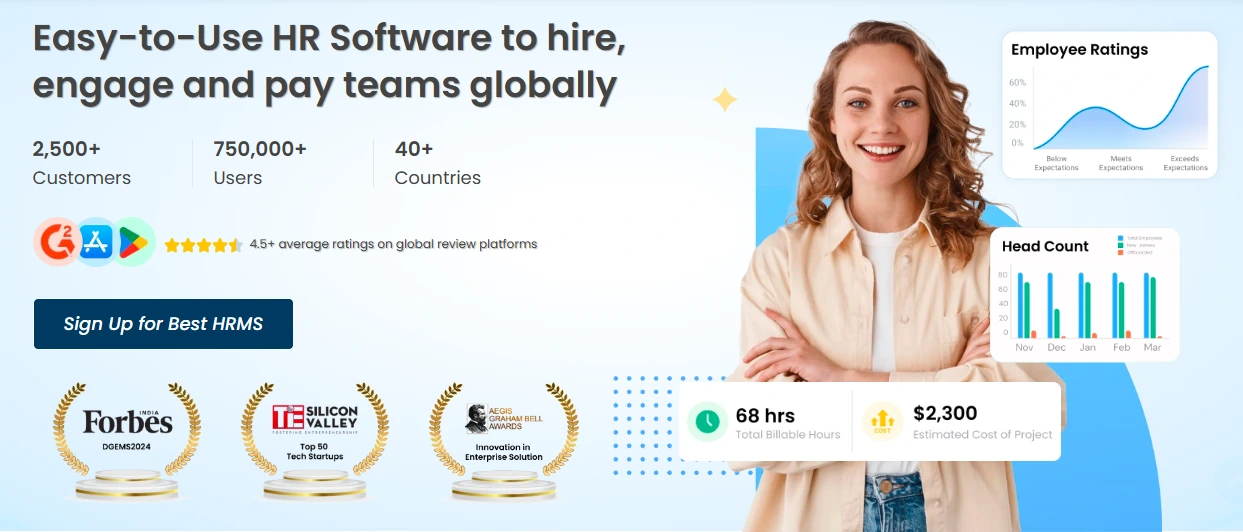
Zimyo’s strength lies in being an all-in-one HR software that includes payroll, HR management (attendance, leave, and document tracking), performance management, and employee engagement tools. It’s simple to use, affordable, and perfect for companies that want a single platform to manage all HR needs easily.
Brief Introduction to HROne
HROne is an intelligent and comprehensive HR software designed for small, mid-sized, and large organizations that want to automate daily HR tasks. It focuses on improving efficiency through HR automation, analytics, and an easy-to-use platform that simplifies people management.
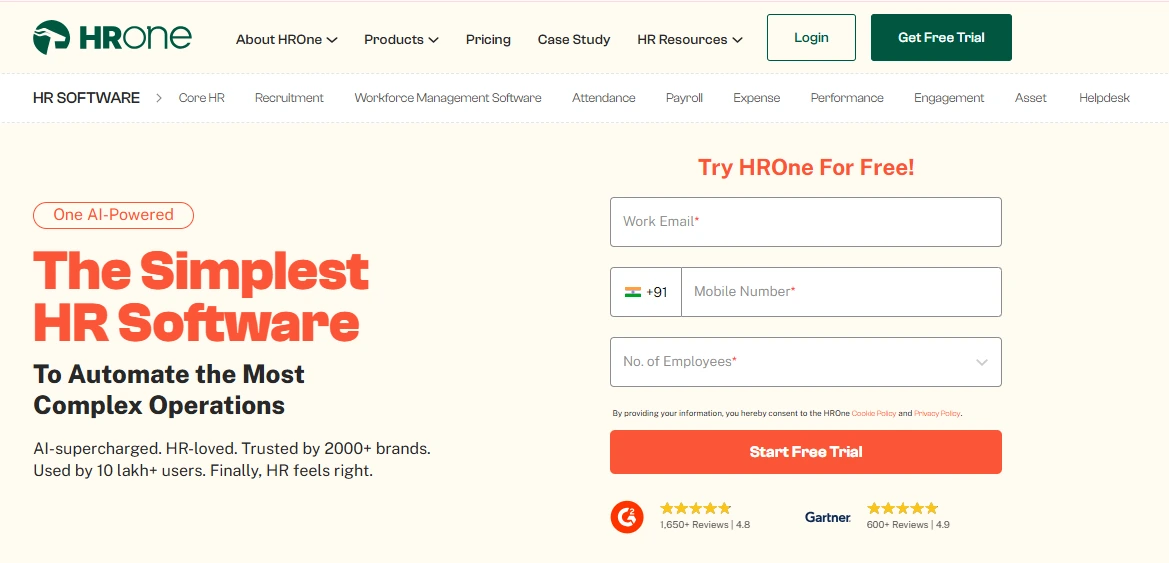
HROne helps companies manage attendance, payroll, recruitment, performance, and employee engagement, all from one dashboard. It also offers mobile accessibility, making it convenient for HR teams and employees. The platform’s main strength lies in its custom workflows and automation, helping HR teams save time and ensure error-free operations.
Zimyo vs HROne: Feature Comparison
Here’s a detailed look at how both platforms compare:
1. Core HR and Employee Management
- Zimyo: Provides an employee database, onboarding tools, document storage, attendance, and leave tracking. Perfect for HR software for small businesses.
- HROne: Focuses on core HR automation with features like employee profiles, digital document storage, attendance and leave management, and automated onboarding workflows.
2. Payroll Management
- Zimyo: Known as one of the best payroll software in USA for startups and SMEs. It supports payroll automation, tax compliance, and payslip generation.
- HROne: Includes a robust payroll engine that automates salary processing, compliance, and tax calculations.
3. Performance and Engagement
- Zimyo: Includes OKRs, continuous feedback, and employee surveys, making it ideal for employee engagement and retention.
- HROne: Offers performance management with goal tracking, appraisal cycles, continuous feedback, and rating systems.
4. Integrations and Automation
- Zimyo: Provides essential integrations with accounting, productivity, and collaboration tools.
- HROne: Offers multiple integrations with ERP, accounting, and productivity tools. It also has built-in workflow automation, so HR tasks like approvals, leave requests, and payroll runs happen automatically.
5. Pricing
- Zimyo: Affordable and transparent, making it one of the best HR software for startups and small businesses.
- HROne: Uses flexible pricing models based on company size and chosen modules. It provides custom plans, ensuring businesses only pay for the features they use.
6. Benefits and Compensation Management
- Zimyo: Allows businesses to manage salary structures, insurance benefits, retirement plans, and voluntary deductions.
- HROne: Lets HR teams handle compensation, variable pay, and benefits in one system. It tracks employee CTCs, deductions, and appraisals while ensuring accurate and compliant payroll calculations.
7. Applicant Tracking System (ATS)
- Zimyo: Offers a simple and affordable ATS with resume parsing, interview scheduling, and offer letter automation. Designed for small and medium businesses.
- HROne: Includes an in-built ATS that streamlines hiring. HR teams can post jobs, track applicants, conduct interviews, and generate offer letters directly from the platform.
8. Compliance and Security
- Zimyo: Ensures compliance with local labor and tax laws, making it reliable for HRIS systems for small business in the USA.
- HROne: Maintains complete statutory compliance, including PF, ESI, and tax regulations. It also follows strong security protocols to keep employee data safe and encrypted.
9. Scalability
- Zimyo: Best suited for companies with 50–1000 employees, focusing on fast-growing small and medium-sized businesses.
- HROne: Scales easily for both mid-sized and large organizations. It is built to handle multiple locations, complex payroll structures, and growing teams.
10. Ease of Use and Setup
- Zimyo: Very easy to set up and operate, with a simple dashboard that requires minimal training. Perfect for small HR teams.
- HROne: Designed for quick setup and minimal onboarding effort. Its intuitive interface allows HR teams to manage tasks easily without needing technical expertise.
Pros and Cons of Zimyo vs HROne
Here’s a simple list showing where each platform does well and where it might fall short:
Feature | Zimyo | HROne |
Pros |
|
|
Cons |
|
|
Which One Should You Choose?
Here’s how to decide, depending on your business needs:
- If you are a small business, startup, or growing company looking for HRMS software in USA, choose Zimyo. It gives you all the tools like payroll, HRIS, performance, and engagement at a low cost.
- If you are a mid-sized or large company that wants automation, analytics, and complete HR process management, HROne is a strong choice.
- If your focus is employee engagement and culture, Zimyo stands out with OKRs, surveys, and recognition tools.
- If your focus is HR automation and productivity, HROne is better with its powerful workflows and centralized dashboard.
- If you want quick setup and ease of use, both Zimyo and HROne are easy to adopt, but Zimyo is simpler for smaller HR teams.
Zimyo vs HROne: Feature Comparison
When you’re comparing Zimyo vs HROne, it’s important to look at every feature side by side so you can decide which platform fits your business best. Both are counted among the Top HRIS Software and leading names in the HR Tech Companies in USA, but they serve slightly different types of organizations.
Zimyo is perfect if you’re looking for an affordable HRIS system for small businesses or startups. It offers everything you need: core HR, payroll, performance, and employee engagement, everything in one simple and budget-friendly platform.
HROne, on the other hand, focuses more on HR automation and workflow efficiency for small, mid-sized, and large businesses. It helps companies simplify complex HR processes, automate manual work, and bring all HR functions together under one system.
Below is a detailed Zimyo vs HROne comparison to help you understand how both platforms perform across major HR areas… and which one suits your company’s size, goals, and budget better.
Let’s explore both systems closely and see how they are different… and where they overlap.
Feature | Zimyo | HROne |
Core HR and Employee Management | Zimyo provides a complete employee database, digital onboarding, attendance tracking, leave management, and document storage. It centralizes all employee information in one place and lets HR teams manage everything from joining to exit smoothly. Its user-friendly dashboard makes it ideal HR software for small business. | HROne offers a strong core HR module with attendance, leave, and document management. It includes customizable workflows, digital employee files, and automated HR processes to reduce manual data entry and save time. |
Payroll Management | Zimyo is recognized as one of the best payroll software in USA for startups and SMEs. It supports automated salary processing, tax compliance, payslip generation, reimbursements, and direct deposits. Payroll data syncs automatically with attendance and leaves, helping HR teams eliminate manual errors. | HROne comes with a powerful payroll engine that automates salary processing, compliance, reimbursements, and tax filings. It’s ideal for companies that manage complex payroll setups or have employees across multiple locations. |
Performance and Engagement | Zimyo includes OKRs, 360-degree feedback, employee surveys, and rewards and recognition tools. It helps HR teams track employee performance, identify skill gaps, and build a strong company culture. These engagement tools make Zimyo a leading employee engagement software for growing businesses. | HROne offers performance management features like goal setting, continuous feedback, appraisals, and performance reviews. It also includes engagement tools such as polls, surveys, and appreciation features to boost employee motivation. |
Integrations and Automation | Zimyo offers essential integrations with accounting, attendance, and collaboration platforms. It also automates HR workflows such as approvals, onboarding, and payroll runs, helping teams save hours of manual work each month. | HROne focuses on HR automation with custom workflows, approval hierarchies, and integrations with ERPs, accounting, and biometric systems. It helps organizations streamline HR operations end to end. |
Pricing | Zimyo provides transparent, affordable pricing plans with no hidden costs. It’s one of the most budget-friendly HR software for startups and small businesses, offering enterprise-grade tools at a small-business price. | HROne offers flexible pricing based on company size and modules. It’s slightly higher in cost but offers deeper automation, advanced analytics, and customization options suitable for scaling organizations. |
Benefits and Compensation Management | Zimyo allows businesses to create salary structures, insurance benefits, and deduction setups. It also supports performance-linked pay, bonuses, and full compensation planning — making it suitable for both startups and mid-sized firms. | HROne manages complex CTC structures, incentives, variable pay, and benefits under one system. It automates entire compensation cycles while ensuring complete compliance with local regulations. |
Applicant Tracking System (ATS) | Zimyo includes a simple yet efficient ATS that helps HRs manage job postings, parse resumes, schedule interviews, and send offer letters — all from one dashboard. It’s built for companies that want to hire faster without complex recruitment tools. | HROne comes with a built-in recruitment system that helps manage the entire hiring cycle — from job posting and candidate tracking to onboarding — all within the same platform. |
Compliance and Security | Zimyo ensures compliance with U.S. labor laws and tax rules, making it a trusted choice for HR teams in the USA. It keeps sensitive employee data safe with encryption and secure access controls. A perfect HRIS system for small business with strong compliance support. | HROne ensures compliance with PF, ESI, TDS, and labor regulations. It uses data encryption and role-based access control to protect sensitive HR and payroll information. |
Scalability | Zimyo is best suited for businesses with 50 to 1000 employees. It grows with your team — supporting expansion from small startup stages to mid-sized business levels — without needing costly upgrades. | HROne scales smoothly with small to large enterprises. It supports multi-branch operations, custom workflows, and role-based dashboards for complex organizational structures. |
Ease of Use and Setup | Zimyo has a clean, intuitive interface and can be implemented in a few days. Even first-time HR software users find it simple to learn and operate, making it perfect for small HR teams. | HROne is user-friendly but slightly more detailed to set up due to its wide range of automation and customization options. Once implemented, it offers smooth and efficient daily operations. |
If you’re a small or growing company looking for a simple, affordable, and complete HR system, Zimyo is the right fit. It combines payroll, HRIS, and employee engagement in one platform.
If you’re an organization looking for advanced HR automation, deeper customization, and workflow control, HROne is a great choice. It’s built for growing and enterprise-level businesses that need efficiency at scale.
Conclusion
Both Zimyo and HROne are among the best HR software in USA, but they cater to slightly different audiences.
- Choose Zimyo if you want Cloud HR software for small business or startups.
- Choose HROne if you need a smart and automated HRMS system for medium to large organizations.
In the end, the Zimyo vs HROne comparison comes down to simplicity and affordability vs advanced automation and analytics.
Frequently Asked Questions (FAQs)
What is the main difference between Zimyo and HROne?
Zimyo is an all-in-one HRMS for small businesses and startups, focusing on payroll, performance, and employee engagement. HROne is more automation-driven and designed for small to large companies that want to digitize all HR operations.
Which software is better for small businesses?
Zimyo is ideal for startups and SMEs that need affordable payroll and HR tools. HROne is better for companies that need advanced HR automation and data management.
Can Zimyo handle multi-location payroll?
Yes, Zimyo supports multi-location payroll and U.S. tax compliance. For complex payroll needs across multiple entities, HROne offers more advanced automation.
Does HROne offer employee engagement tools like Zimyo?
Yes. HROne includes feedback tools, surveys, and recognition features to improve engagement and performance.
Which software is easier to set up and use?
Both are user-friendly. Zimyo is simpler for small HR teams, while HROne has more modules and needs slightly more setup time.
Can both software manage benefits and compensation?
Yes. Zimyo and HROne both handle salary structures, benefits, and deductions efficiently.
Does HROne include a recruitment system?
Yes. HROne has a built-in ATS to manage hiring workflows, interviews, and onboarding.
Which software is more affordable?
Zimyo is more cost-effective for startups and SMEs. HROne offers customized pricing and may be higher depending on chosen modules.
How scalable are Zimyo and HROne?
Zimyo works best for 50–1000 employees. HROne can support mid to large companies with thousands of employees.
How do I choose between Zimyo and HROne?
Choose Zimyo if you want a simple, affordable HRMS with strong engagement tools. Choose HROne if you want advanced HR automation, analytics, and workflow efficiency.

